Norco’s bump-eating Range C1 enduro mountain bike is designed for the rough and tumble of the burliest descents, while still providing a comfortable and efficient means to winch back to the trailheads.
Running 29in wheels front and rear, and sporting 170mm of high-pivot suspension, this range-topping C1 costs £8,999/$8,249/€9,999. It's no surprise, then, that Norco claims it’ll be your “ultimate big mountain companion”.
Out on the trails, it’s got plenty of fire in its belly, making light work of the rowdiest and most gruelling descents. The high-pivot design smoothes out the trail’s energy- and speed-sapping imperfections with impressive precision.
And while it feels incredible on gnarly descents, it’s the scope of the performance that surprised me. While not as fast as the best cross-country race bikes, it covers miles with impressive efficiency and comfort for an enduro bike, flying in the face of its travel figure, and the frequently assumed idea that high pivot-bikes drain watts on the climbs.
If you’re after a bike for big mountains and hefty hits, the Range will be very much at home, but it’s comfortable and relatively efficient to pedal back to the top of your favourite mountain too.
Norco Range C1 frame and suspension
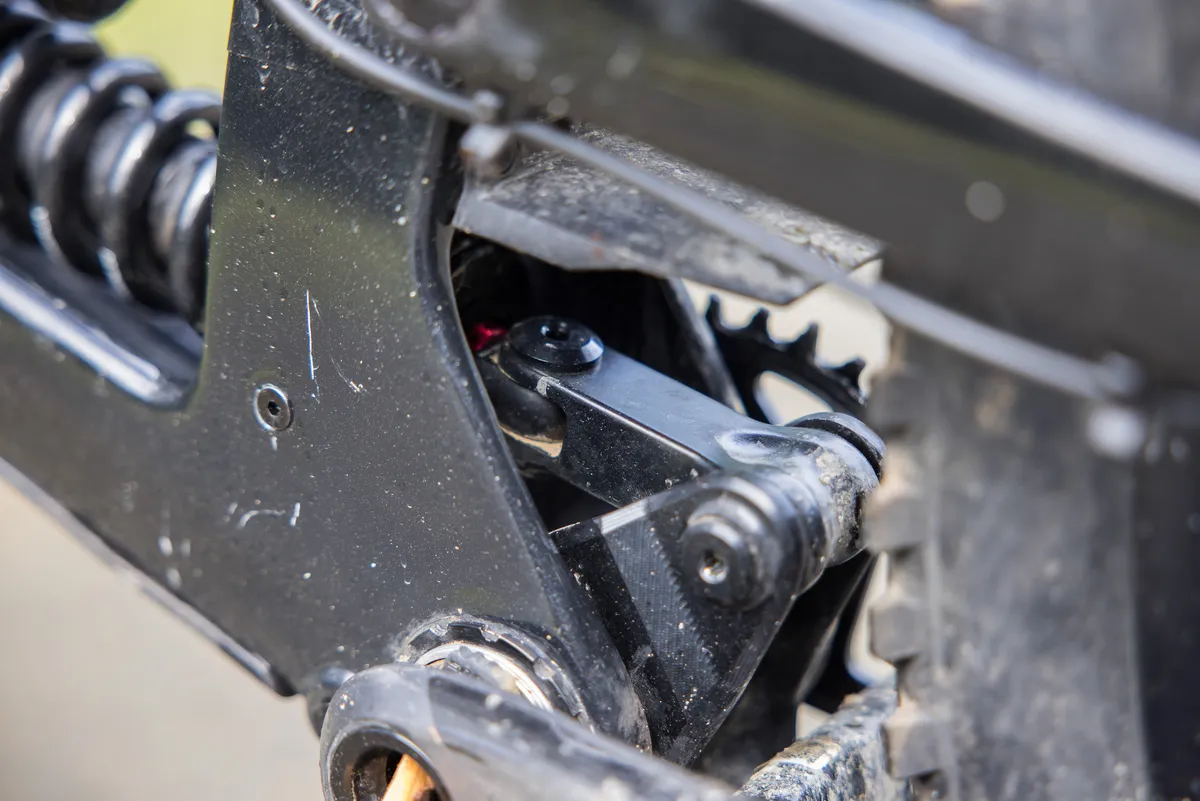
Made from carbon fibre, the Range C1’s frame is sleek-looking thanks to a low-slung rear shock and relatively thin tubes.
With 29in wheels front and rear, and a longer than usual 170mm of suspension travel, the high-pivot design gives it a rearward axle path. This helps the rear wheel move up and backwards out of the way of bumps, reducing the effects of impacts on the bike and rider. We’ve got a full explainer on high-pivot bikes, if you want to learn more.
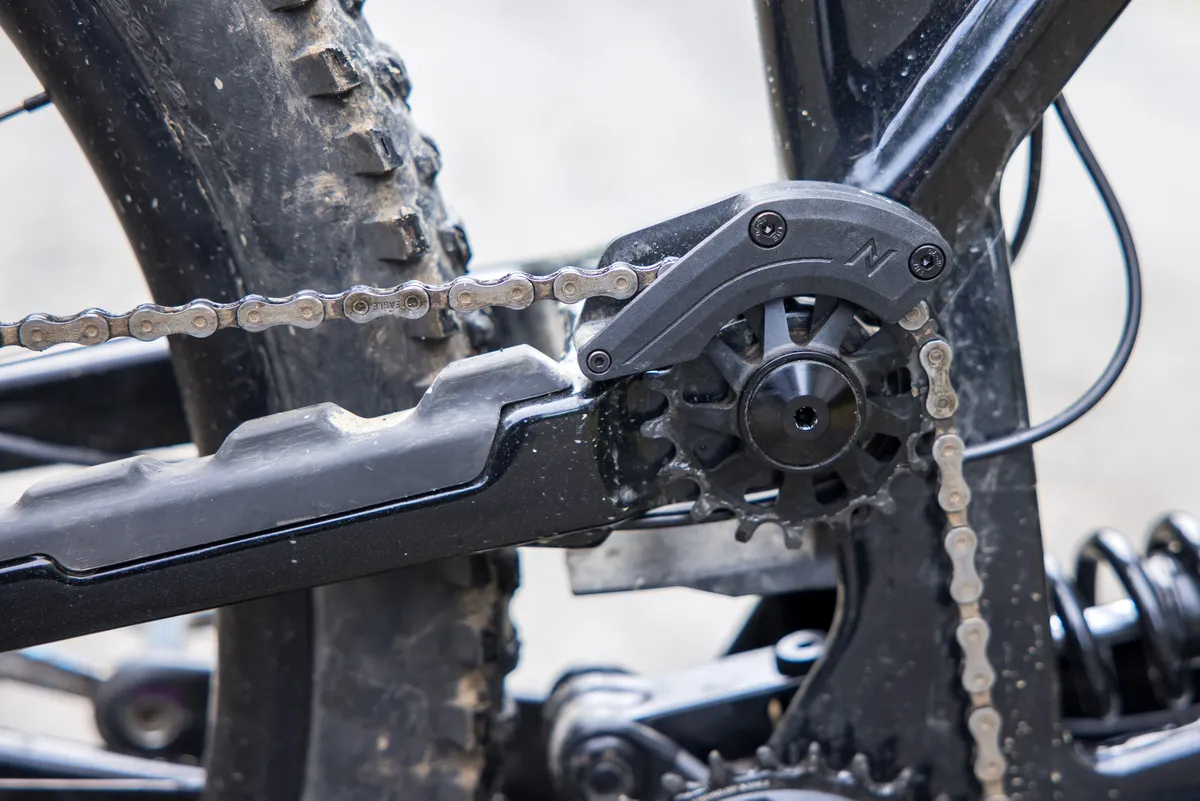
To control pedal kickback and tune anti-squat, the chain is routed over an idler wheel that’s placed near to the rear suspension’s virtual pivot point.
Although unusual to look at, the principle of an idler is simple; the closer to the main pivot point the chain runs, the less the suspension and pedalling forces interfere with one another.
Nifty bolt-on rear dropouts mean Norco can adjust the length of the Range’s rear centre depending on its size.
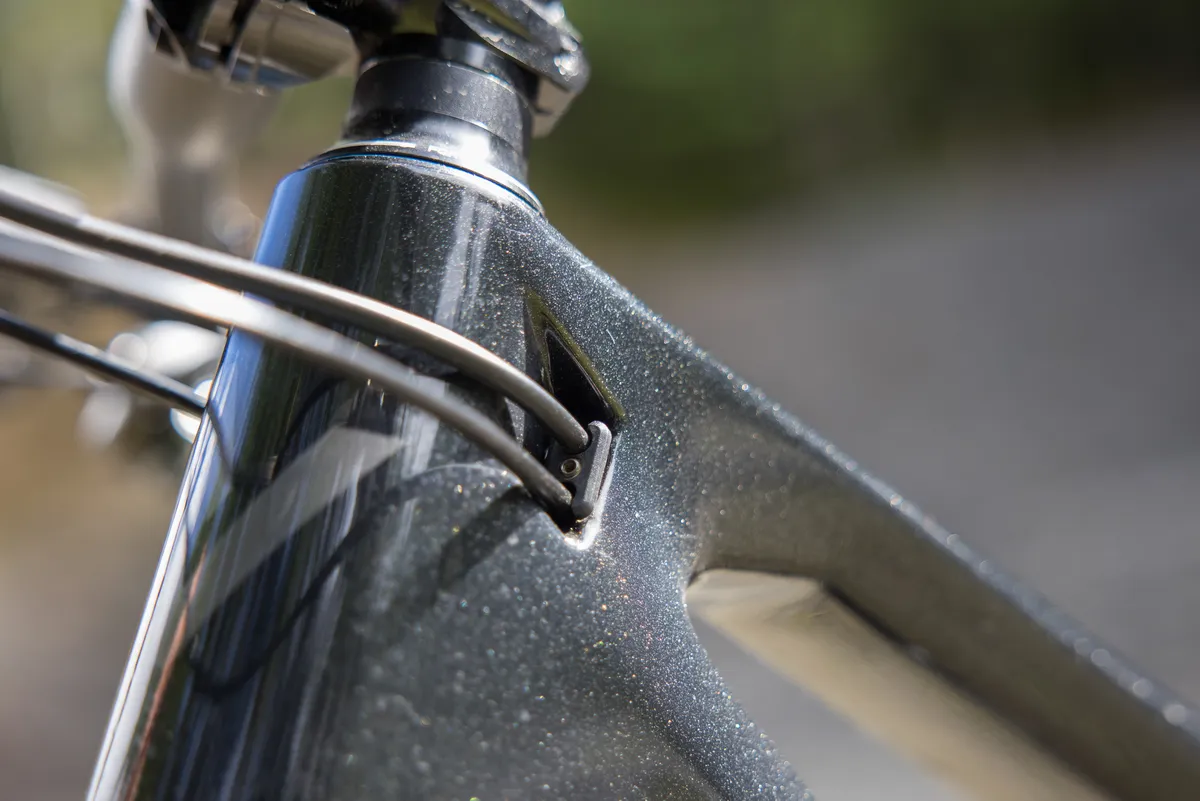
Home mechanics will be pleased to know cables are routed internally via ports on the side of the head tube rather than the headset. All of the bike’s pivot bolts are easily accessible, too.
Ample chain-slap protection ensures relatively quiet performance – even on extremely rough descents – and the frame sports both a bottle mount and an under-top tube accessory mount.
Norco Range C1 specifications
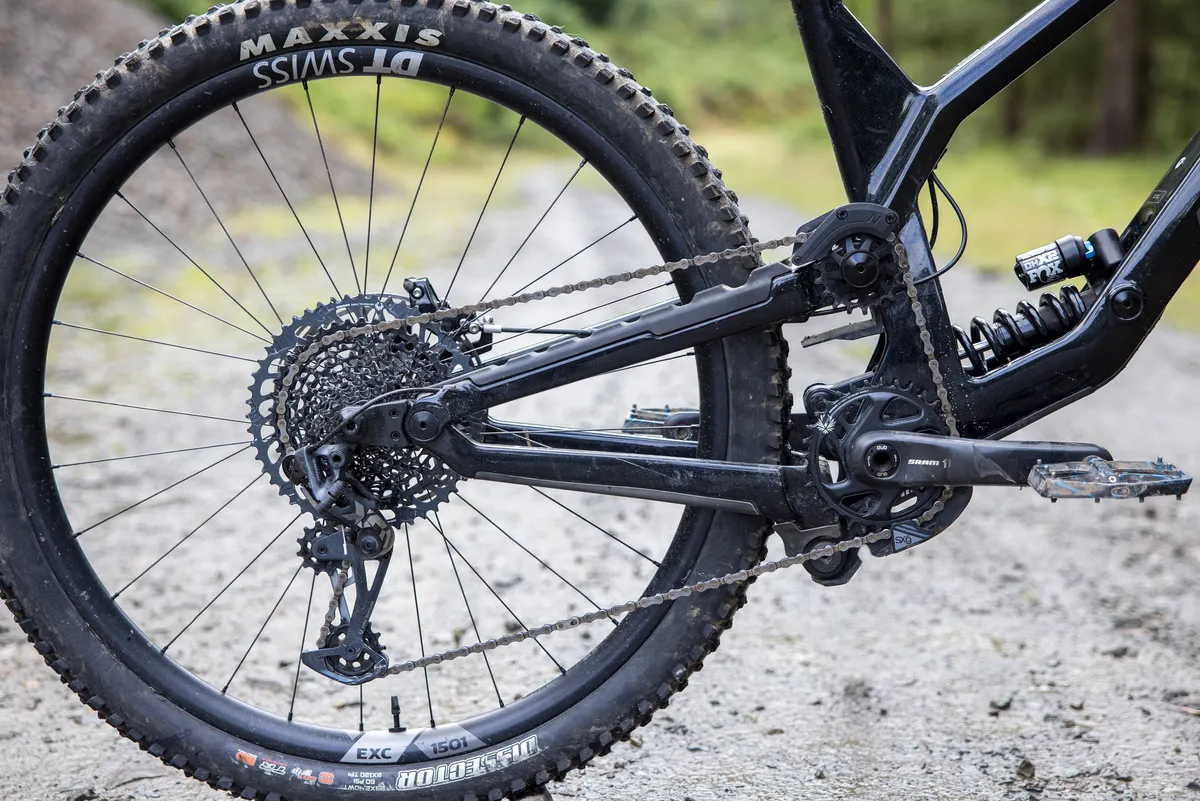
As the Range line-up’s halo bike, the C1 is dripping in top kit.
Fox’s Factory-level 38 fork sits up-front, while the ultra-adjustable DHX2 is out back. SRAM’s X01 Eagle cable-operated drivetrain is fitted, along with Code RSC brakes.
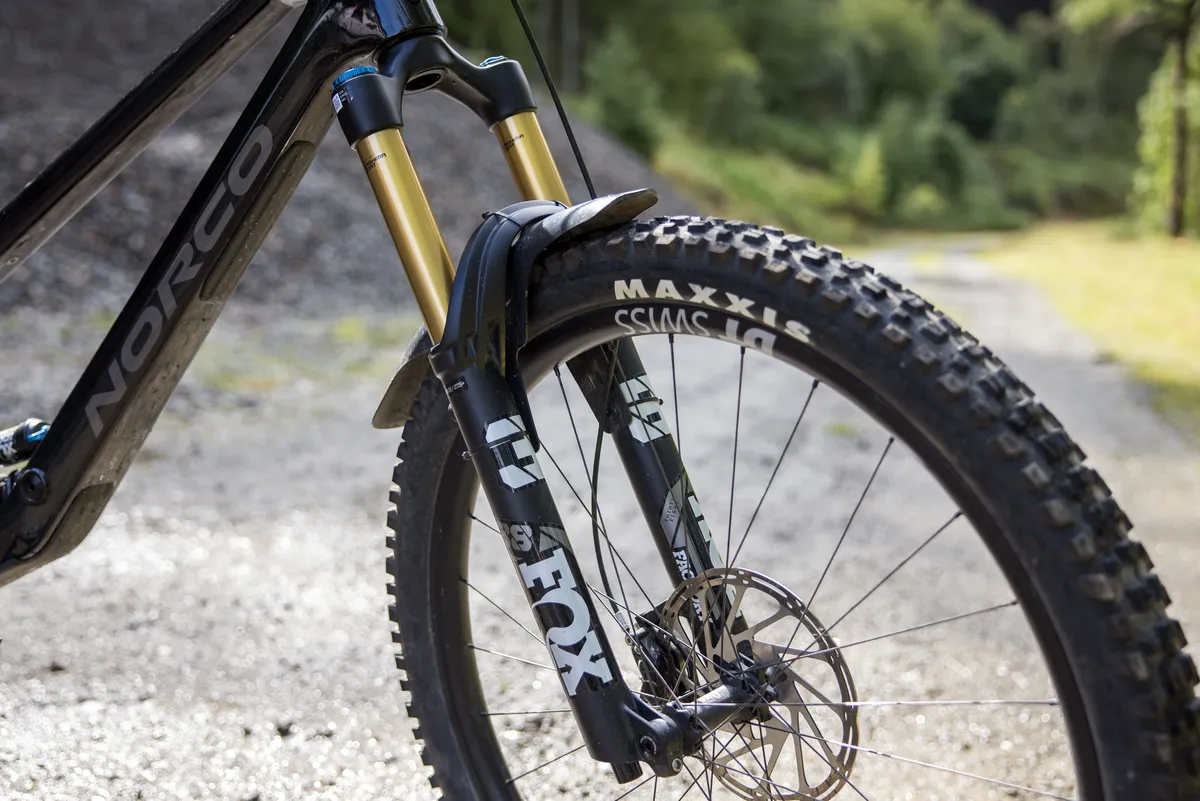
DT Swiss’s impressive and expensive carbon fibre EXC 1501 wheels are wrapped in Maxxis MaxxGrip DoubleDown rubber (Assegai front, Dissector rear), resulting in a feathery 16.64kg headline weight (large, without pedals).
OneUp’s 210mm-travel dropper is fitted into the Range’s deep and straight seat tube.
Norco Range C1 geometry
| Size | Small | Medium | Large | Extra-large |
|---|---|---|---|---|
| Head angle (degrees) | 63.75 | 63.5 | 63.25 | 63 |
| Seat tube angle (degrees) | 76.5 | 76.75 | 77 | 77.25 |
| Seat tube length (mm) | 370 | 395 | 410 | 455 |
| Effective top tube length (mm) | 568 | 598 | 628 | 658 |
| Bottom bracket drop (mm) | 20 | 20 | 20 | 20 |
| Wheelbase (mm) | 1203 | 1243 | 1285 | 1329 |
| Chainstay length (mm) | 440 | 440 | 442.5 | 447.5 |
| Stack height (mm) | 618 | 630 | 641 | 653 |
| Reach (mm) | 420 | 450 | 480 | 510 |
Available in four sizes, from small to extra-large, at 178cm tall I chose to ride a large.
It has a sweet spot 480mm reach figure and an enduro-ready 63.25-degree head tube angle. That deep seat tube is also steep, with a 77-degree effective angle helping place your hips directly over the cranks.
Dubbed 'Ride Aligned', Norco uses the bolt-on dropouts and tweaks to other geometry figures to change the Range’s proportions for each rider. This is great for smaller and bigger people alike, where each size retains the same front-to-rear ratio and handling.
Norco Range C1 ride impressions
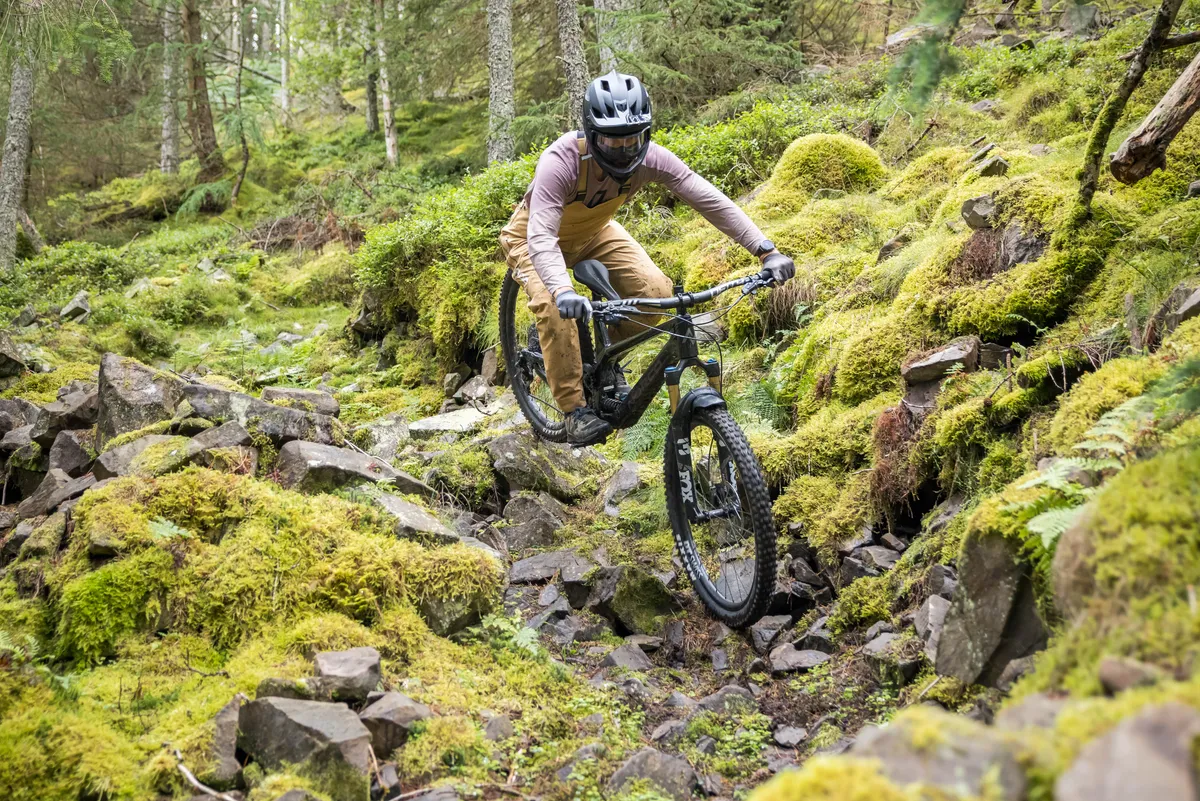
I tested Norco’s Range C1 in Scotland’s answer to the Canadian brand’s British Columbia home territory.
The Tweed Valley has more downhill, enduro, trail and cross-country riding in one spot than any other place in the UK. This meant I could hit up the world-famous enduro trails at Golfie in the morning, then pedal across open, rocky moorland to the Glentress trail centre and finish off with DH runs that end at the front door.
During the test period, I got a deep understanding of how the Range rides in the widest gamut of trail types, and gave it a good workout at the same time.
Norco Range C1 setup
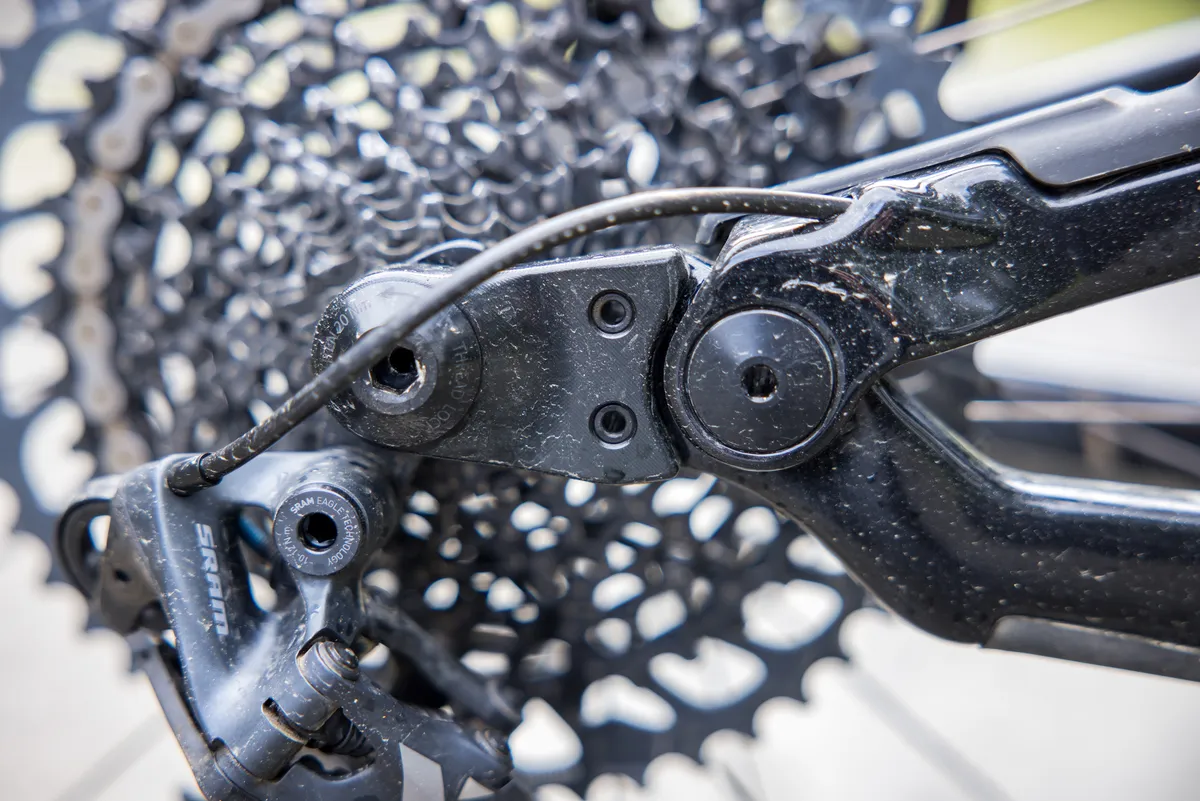
Norco’s online setup guide (also called Ride Aligned) works in conjunction with its bikes’ geometry and suspension kinematics to provide a setup it claims “matches each individual bike to the human who rides it”.
I inputted my height, weight, skill level and riding position, and the brand's algorithm produced recommended settings for the Range.
In Fox’s 38, Norco recommended inflating the air spring to 84psi and installing a single volume-reducer spacer (reducing the number from the two factory-installed spacers). The recommended damper settings were:
- Low-speed rebound: 6 clicks out from fully closed
- High-speed rebound: 6 clicks out from fully closed
- Low-speed compression: 15 clicks out from fully closed
- High-speed compression: 7 clicks out from fully closed
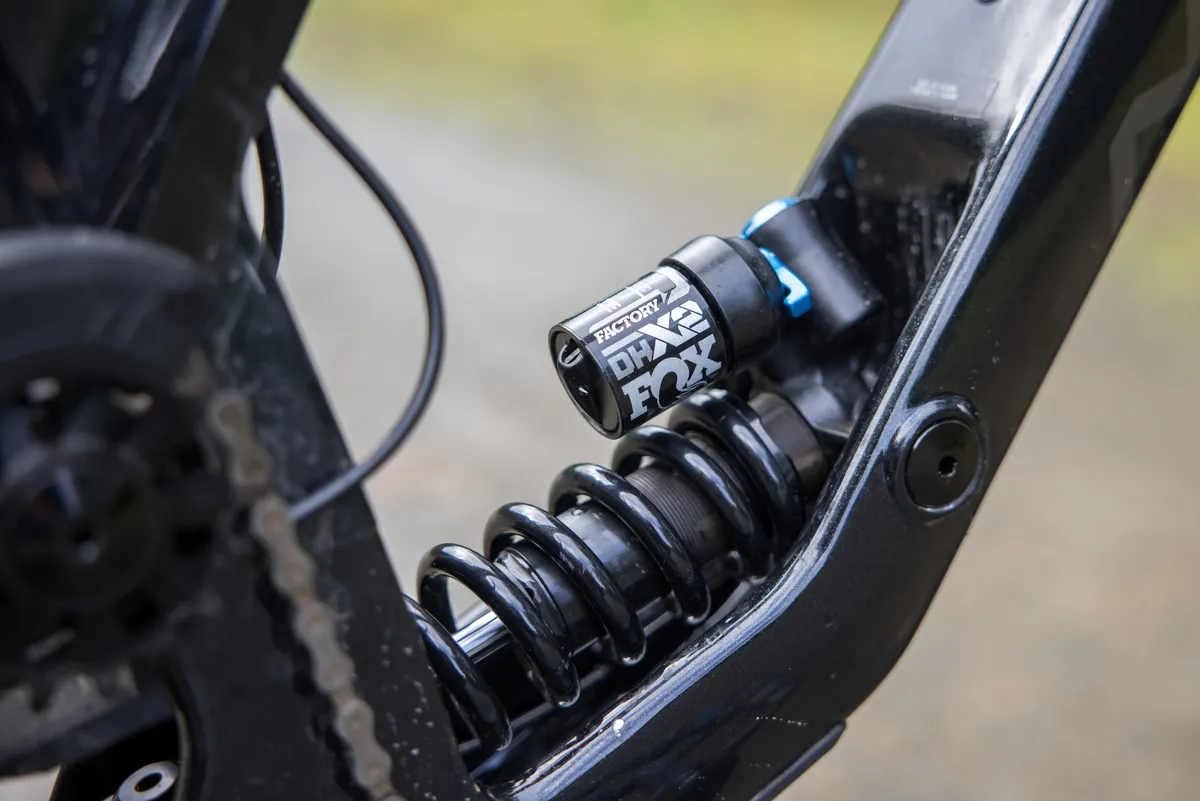
For the DHX2 rear shock, it recommended a 500lb/in spring. The suggested settings for each damper adjustment were:
- Low-speed rebound: 12 clicks out from fully closed
- High-speed rebound: 6 clicks out from fully closed
- Low-speed compression: 14 clicks out from fully closed
- High-speed compression: 6 clicks out from fully closed
It suggested setting the low-speed rebound 12 clicks out from fully closed, high-speed rebound 6 clicks out from fully closed, low-speed compression 14 clicks out from closed and the high-speed compression 6 clicks out from fully closed.
Along with suspension settings, Ride Aligned also recommended my bar width and rise, number of stem spacers, stem length and even tyre pressures.
During my initial testing, I found the fork too soft and choked by damping. I added a volume-reducer spacer and increased pressure to 95psi, while setting all compression and rebound-damping adjustments to fully open.
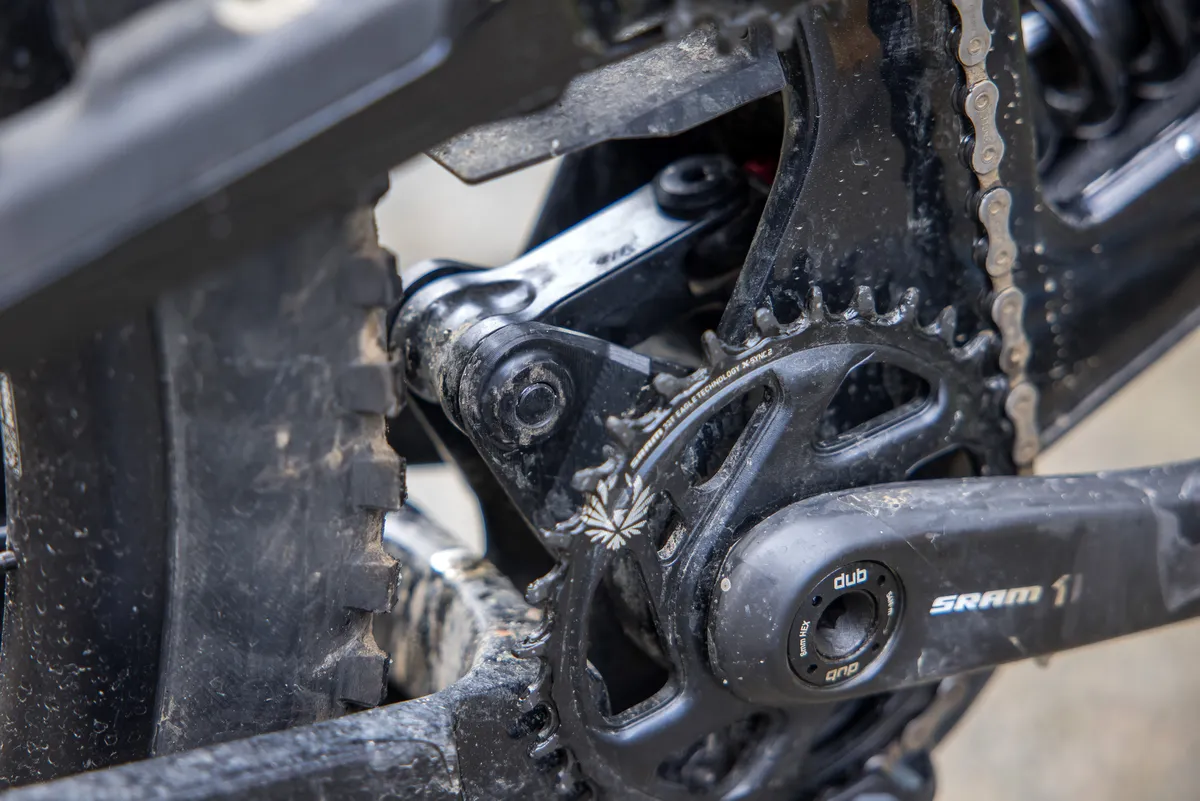
The rear spring rate gave the right amount of sag (18mm) and prevented the shock from hard bottom-outs, but the shock felt it could be more responsive at the start of its travel. Like the fork, I set the external damper adjustment to fully open.
Norco caveats that its recommended settings are a good starting point rather than set-in-stone numbers every rider has to use.
I found them, true to the brand’s word, as a good place to start.
The finer nuances of rider preference will always guide how you want your bike to feel, but being open-minded and trying the suggested settings is a worthwhile experience; you never know, it might feel better than how you were going to set up your bike.
Norco Range C1 climbing performance
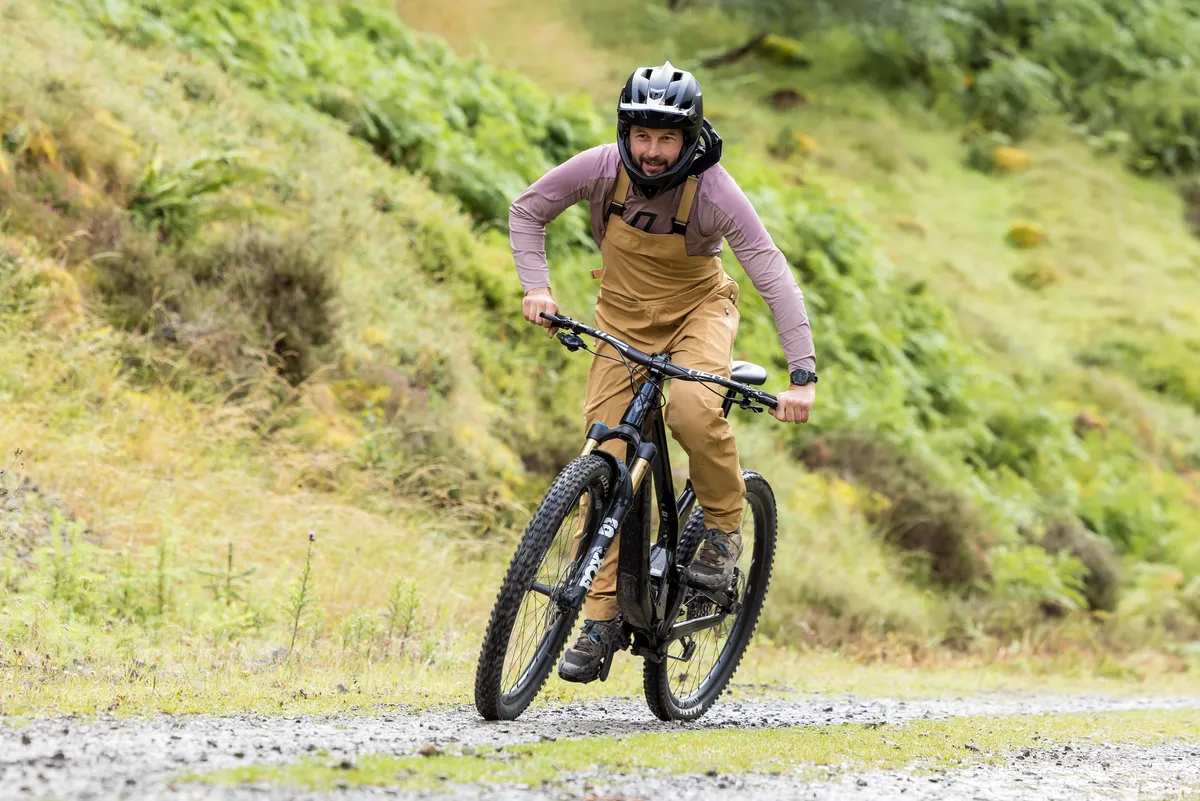
Heading uphill, the Range epitomises the winch-and-plummet enduro bike feel.
Encouraging me to hold my shoulders high, facing forward rather than towards the ground, my body remained upright and stable, supported by the bike’s high front end and steep seat tube.
Even as sag increases on steeper inclines, my hips barely tilt rearwards past the bottom bracket.
It feels remarkably efficient in this respect; I didn’t have to shuffle or reposition myself on the seat in search for that perfect riding position or extra control.
The massively sensitive rear suspension works overtime to smooth out the trail.
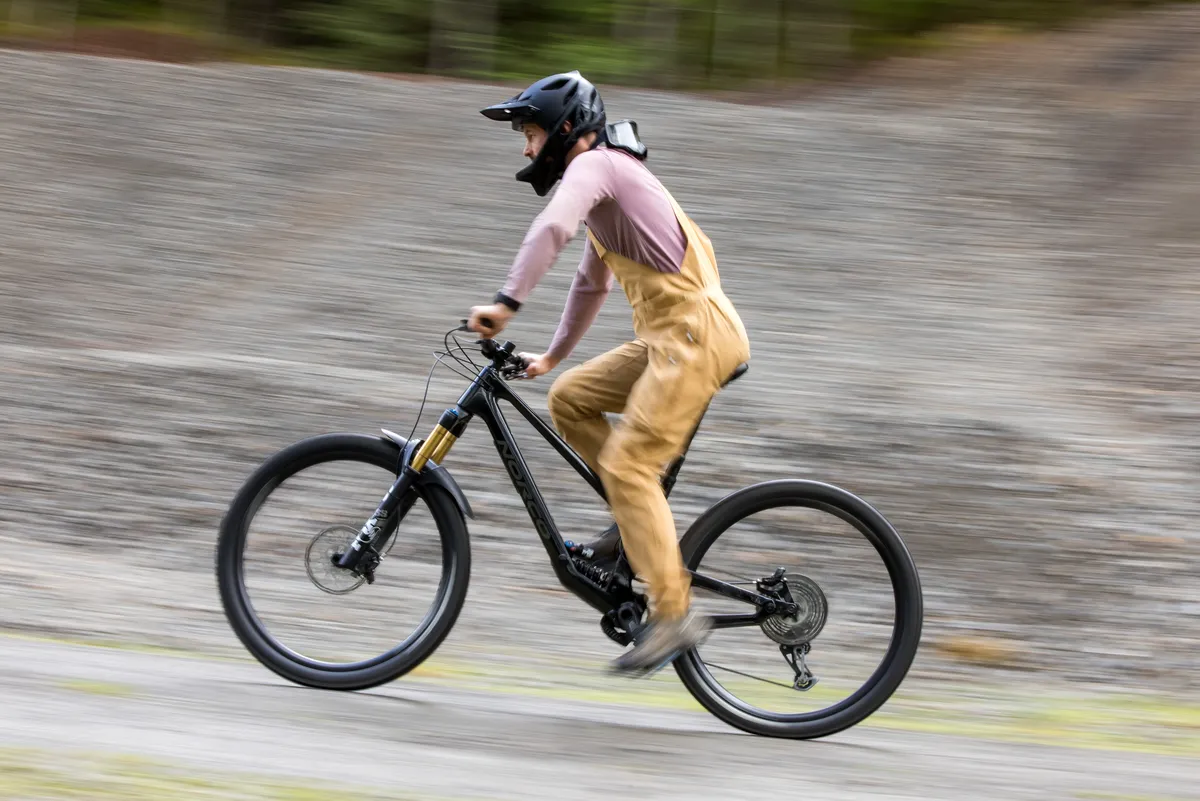
Plough headlong and without mechanical sympathy into rock-strewn sections of climb and the Range’s suspension capabilities are truly lit up.
Absorbing bumps with immaculate smoothness, it’s like sitting in the back of a Citroen with hydropneumatic suspension charging across a freshly ploughed field.
Although comfort is a clear benefit, traction is also outstanding.
Hammer through the pedals on loose terrain and the rear-end actively searches out grip.
It quivers in and out of its travel unaffected – thanks to that idler wheel – by the stiffening forces of increased anti-squat, resulting in impressively quick forward drive.
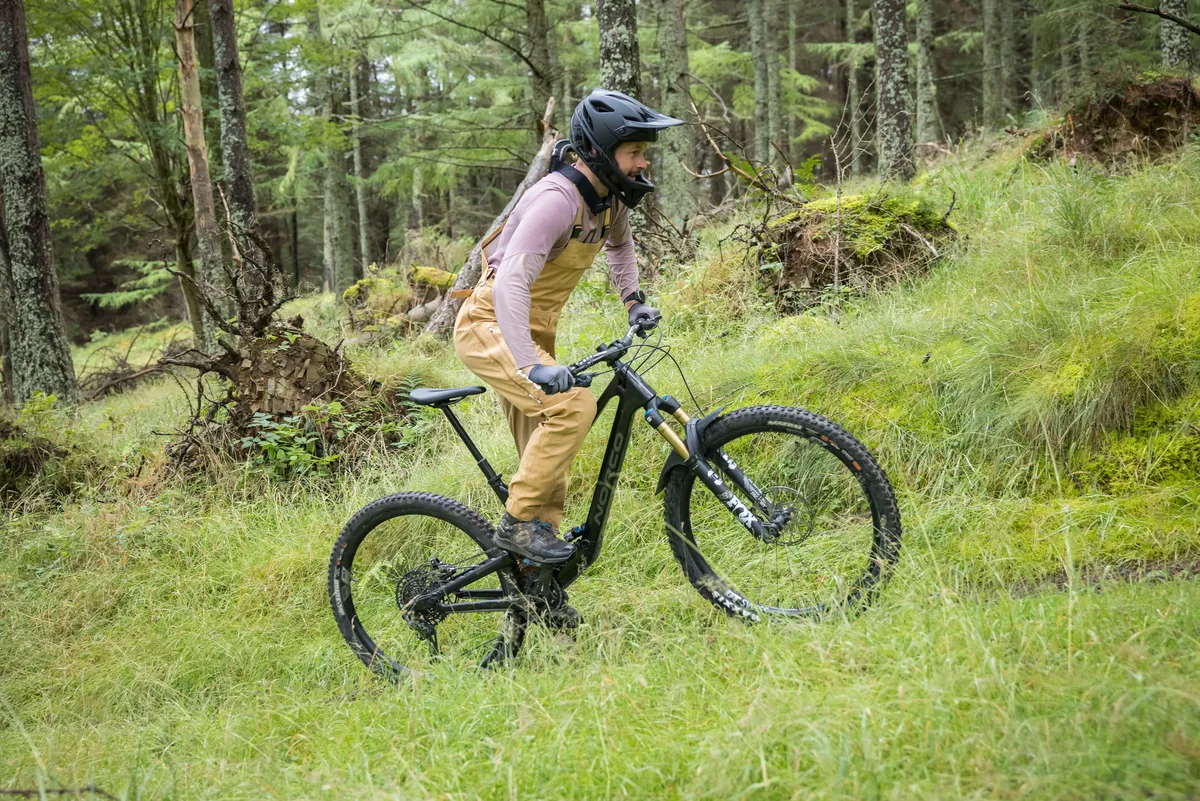
But this otherworldly traction and smoothness comes at a cost; pedal bob is pronounced, especially on smoother, higher-cadence climbs. The rear dips as freely into its travel under rider input as it does when absorbing bumps.
Mitigating that by flicking the shock’s climb lever is effective, but also compromises comfort and traction. I preferred to leave the shock’s oil flowing free, rather than choking the impressive ride.
Any claims that idler wheels reduce pedalling efficiency aren’t a problem here. The Range’s pulley – when the drivetrain is dry or particularly dirty – emits more noise, but it certainly doesn’t restrict the free-spinning nature of SRAM’s drivetrain.
Norco Range C1 descending performance
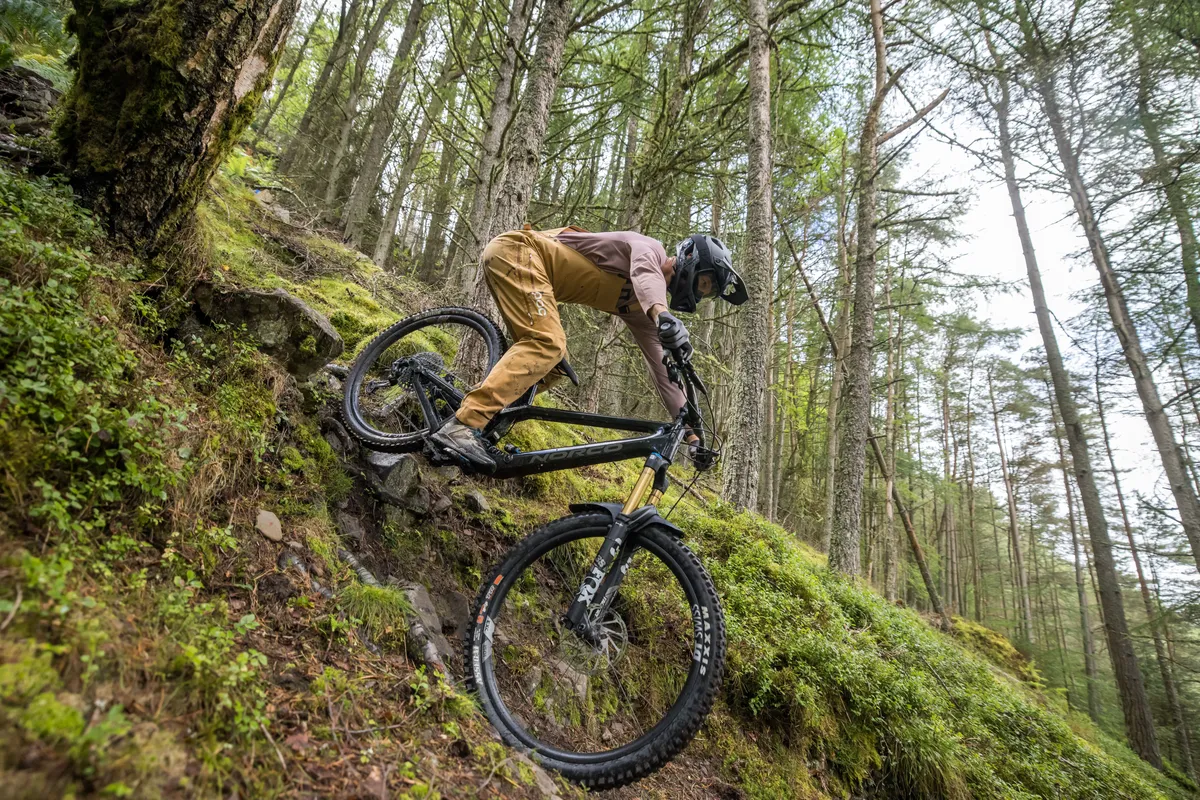
Riding downhill, the Norco is like having the gentle whisper of a reassuring friend in your ear. It encourages you to let off the brakes, push harder and enjoy the free-flowing sensations of gravity-focused riding.
The rear suspension combines the best bits of a bike tester’s holy grail; it’s supple and smooth at the start, has plenty of mid-stroke ramp-up for high-speed G-outs and geometry stability and, finally, offers impressive bottom-out resistance to reduce hard-stop landings.
Dive into a criss-cross section of square-edged roots and it’ll take care of business – almost, but not entirely, isolating the trail’s rough, sharp stings.
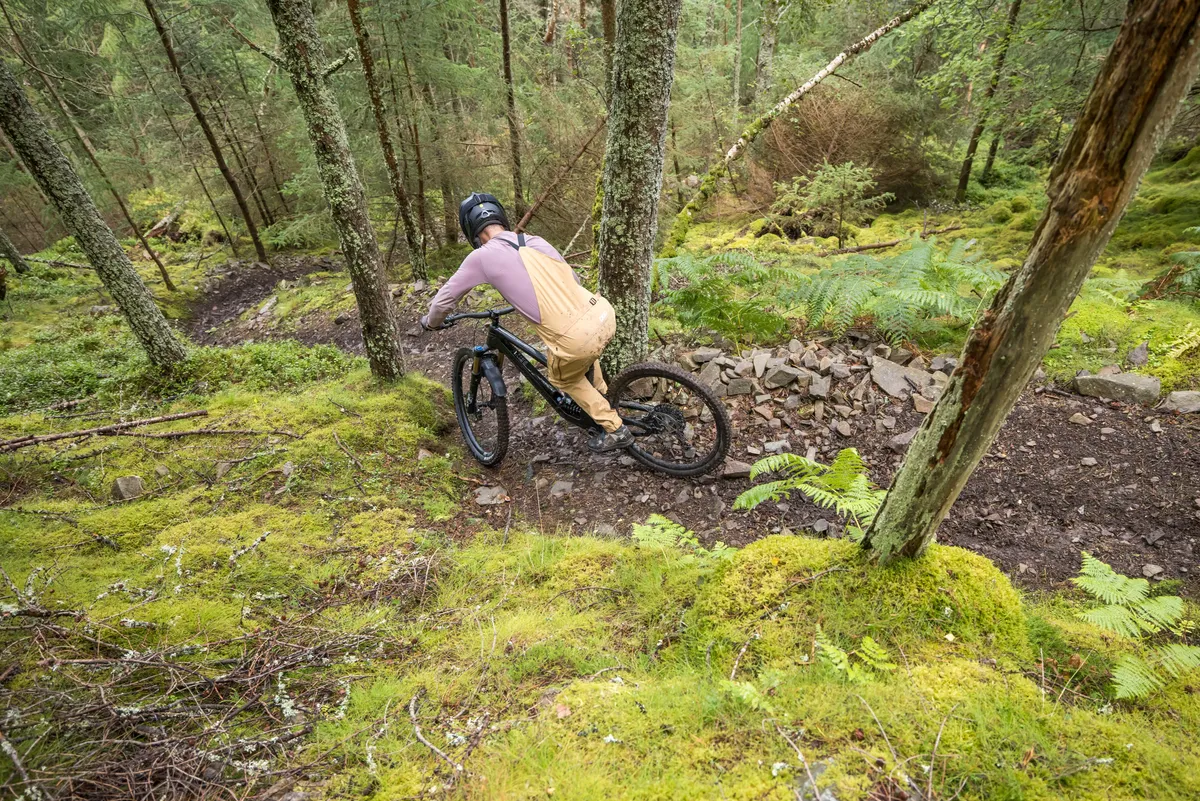
Stay in the shock’s beginning stroke and seemingly little slows the Range down, opening up a discernible performance benefit over bikes with traditional suspension designs.
Increase bump size and amplitude, which causes the rear suspension to dive deeper into its travel, and that advantage shrinks.
As the rear wheel moves from its rearward to vertical – at the very end, forward portions of its axle path – the Range’s behaviour is closer to a low-pivot bike.
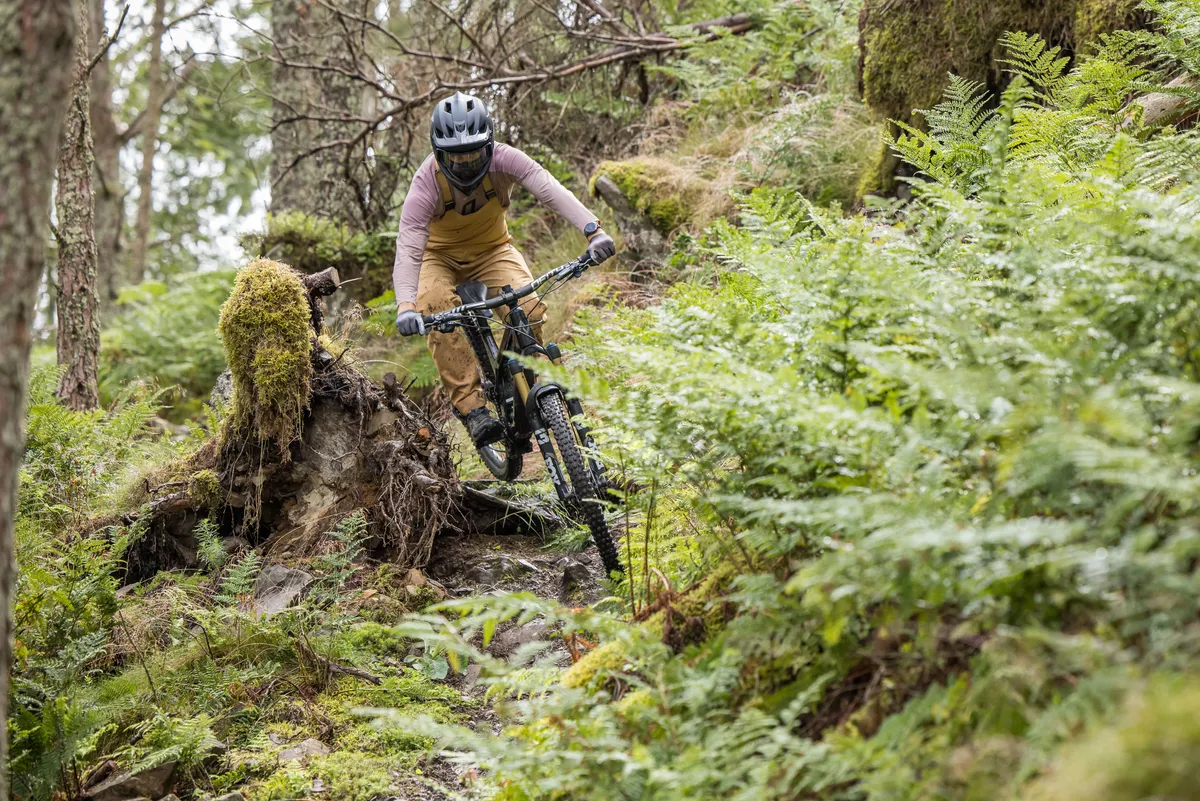
Thankfully the stout mid-stroke support and pronounced but gently tapering bottom-out performance – which matches the progressive ramp-up of the fork’s air spring well – keep things on track and speeds high.
That impressive suspension performance wouldn’t be anything without the back-up of decent geometry.
The Range has that in spades, though.
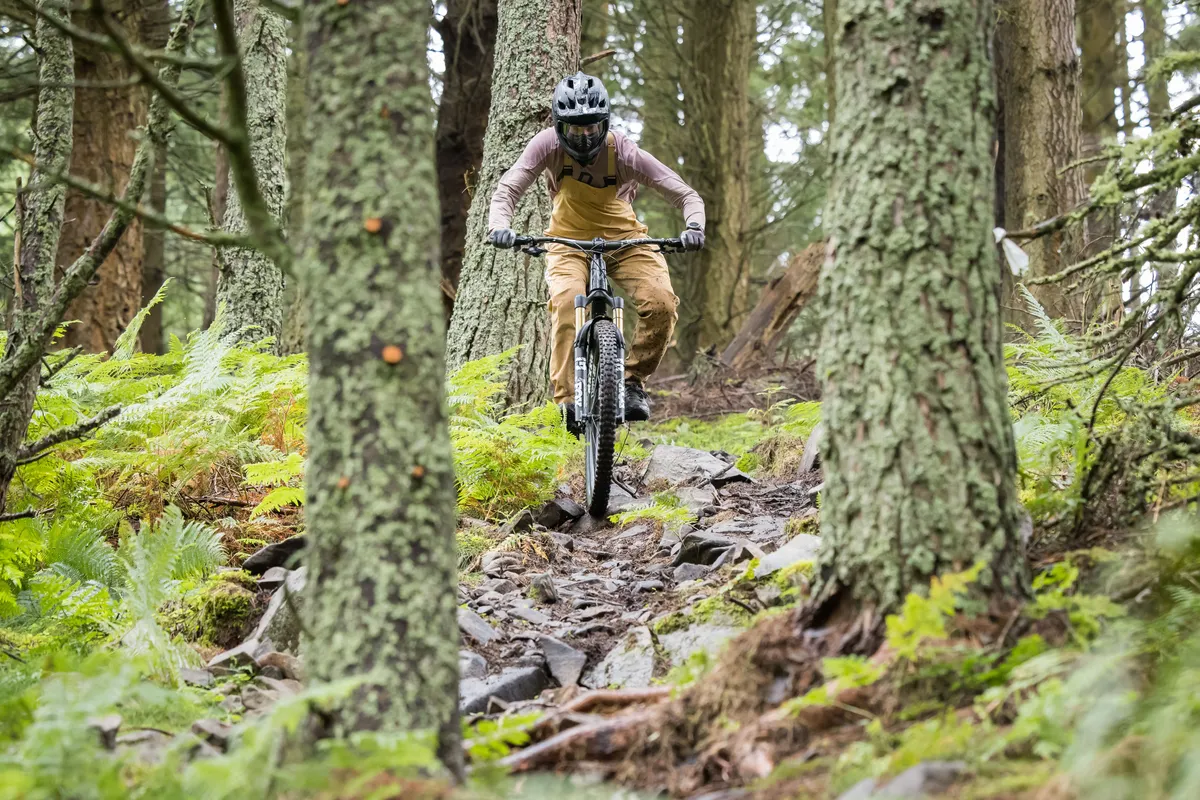
A slack head tube angle means weighting the front wheel to drive grip or speed on steep sections isn’t a perilous affair.
There’s plenty of bike, both in front and behind you, delivering reassuring stability and balance.
The hand-to-feet relationship adds to this. The stack (641mm) and bottom bracket (355mm), along with the reach, combine to create this neutral, balanced feel.
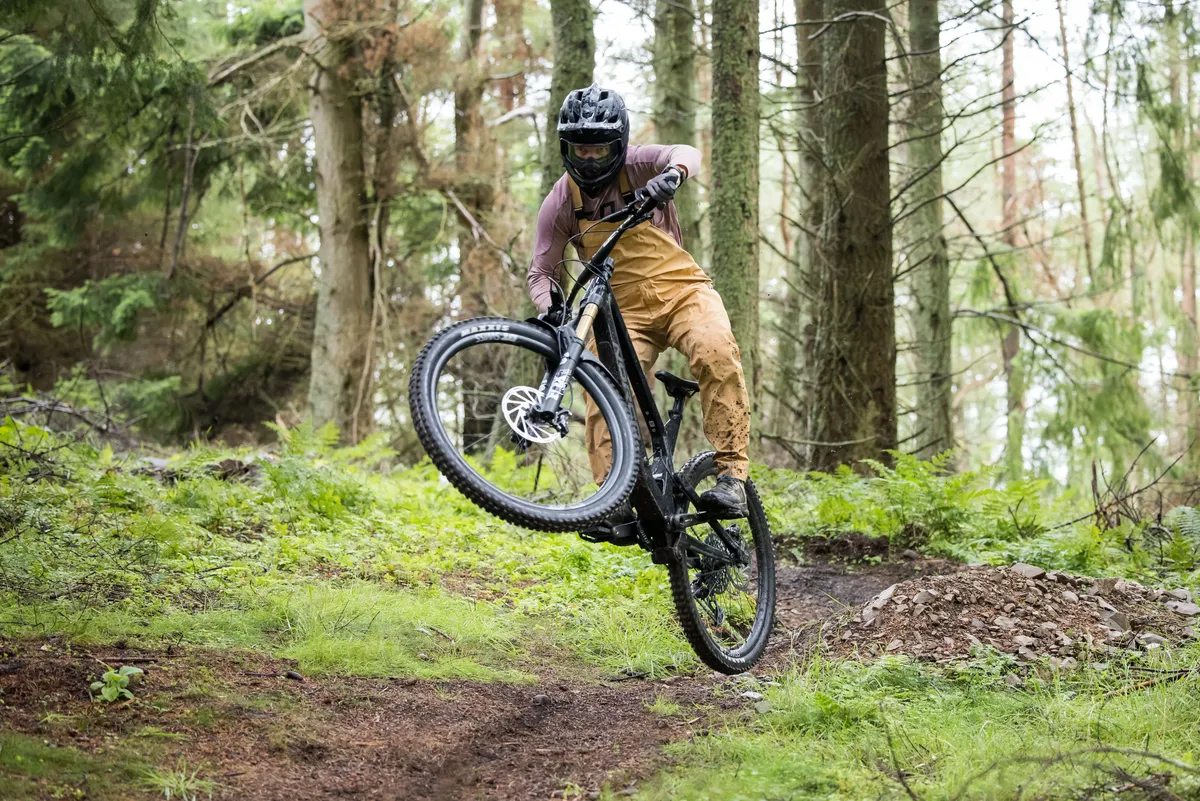
However, the Range can be made yours with bar-height tweaks, setting it up for steeper tracks (higher front end) or mellower runs (lower front end).
While the static bottom bracket height might seem lofty, the rear suspension can be run with plenty of sag, helping to lower the dynamic height. It’s also well-matched to the stack, creating an easy-to-ride feel.
Remaining relatively inactive on the bike over choppy terrain feels great. Little energy needs to be wasted with excessive weight shifts to keep it pointing in the right direction, or to compensate for significant, upsetting geometry changes.
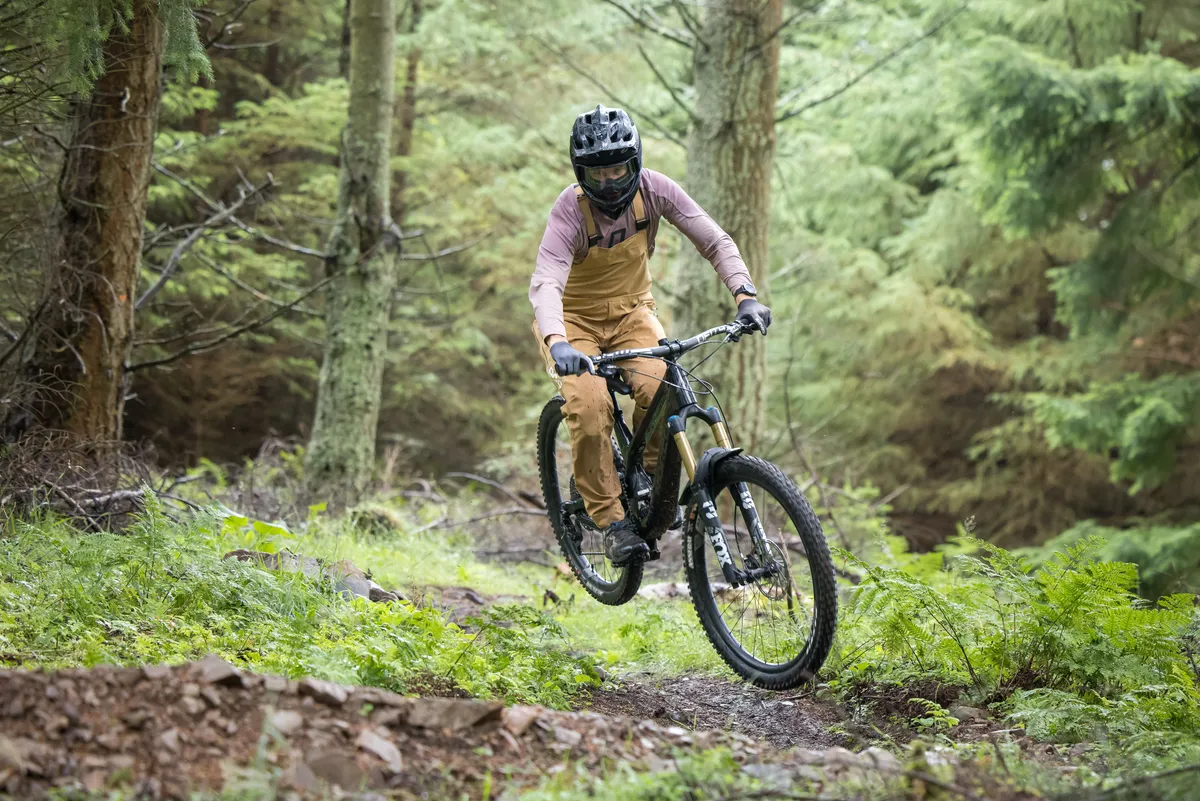
Push or pop into or through the terrain and it comes alive. While it can be made to plough its way through the chop, and can be pushed very hard doing so, it’s not a blunt instrument.
With careful and decisive rider movements, it can flick and flitter between lines and over the terrain.
This is helped by the well-damped properties of the frame and component list. Buzz and harshness are basically non-existent.
How does the Norco Range C1 compare to the Devinci Spartan HP?
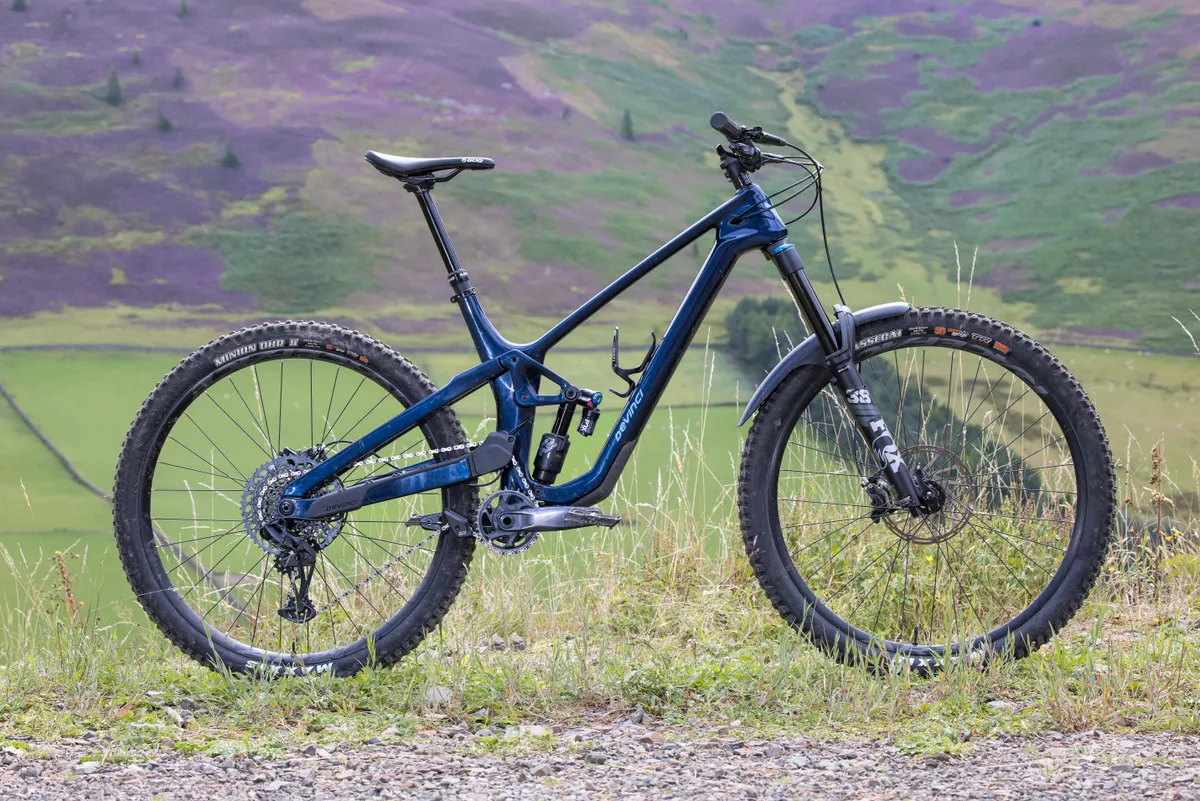
There aren’t a huge number of direct high-pivot competitors to the Range C1, especially from brands as established and big as Norco.
Canadian counterpart Devinci’s Spartan HP springs to mind, though.
Also built from carbon fibre, it has 29in wheels front and rear, but has 160mm of rear-wheel travel compared to the Norco’s 170mm.
The suspension design differs, too.
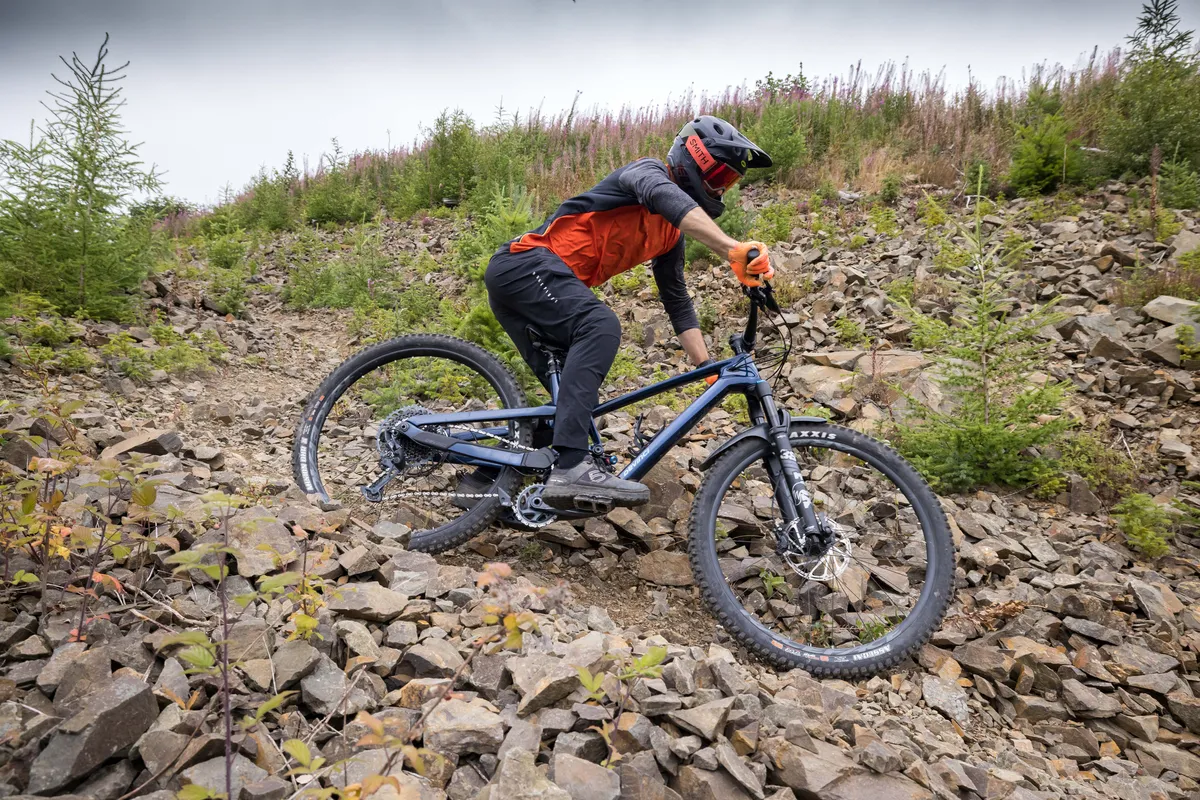
Using Dave Weagle’s Split Pivot system, the Spartan is better described as a mid-pivot, with the rear wheel only arcing back 17mm, according to Linkage design.
The Norco’s inverted Horst-link system has just under 25mm of rearward movement, also according to Linkage design, and makes the Range a true high-pivot design.
On the trail, the Devinci feels calm and composed, but rides more like a bike with a ‘normal’ suspension design.
The Norco, on the other hand, has an added smoothness and plushness that’s generated by the increased composure afforded by its suspension.
Norco Range C1 bottom line
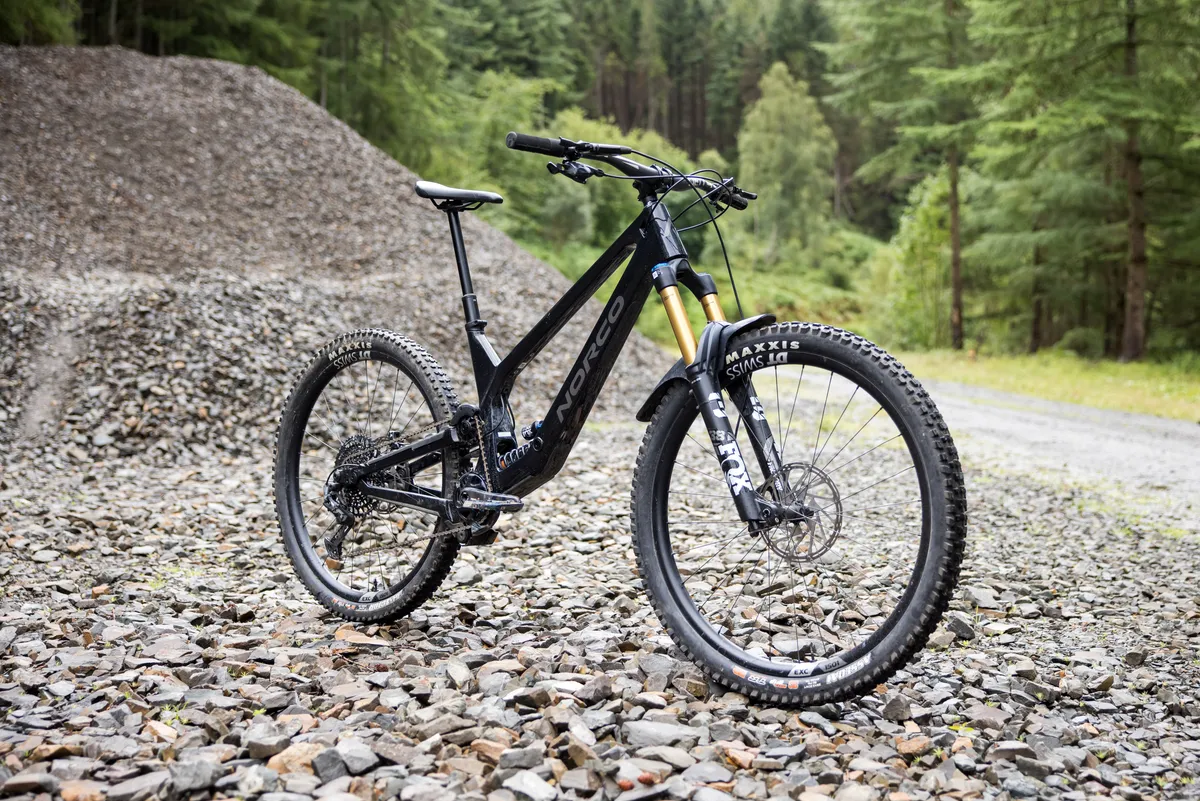
The Range is an impressive performer, but in a wider set of circumstances than I initially expected.
Yes, the rear suspension bobs more than other bikes when you’re spinning at higher cadences, but its rate of bump absorption is remarkable.
Going against its enduro credentials, this smoothness improves perceived efficiency – or at least decreases perceived effort – during long, flatter stints in the saddle, where you don’t have to work as hard to maintain speed.
Put a set of faster-rolling tyres on the Norco and it’s possible to fly along trails not usually suited to the Norco’s long-travel nature. Add in a comfortable – although not hugely aggressive – riding position and big days in the hills are nothing short of thoroughly enjoyable.
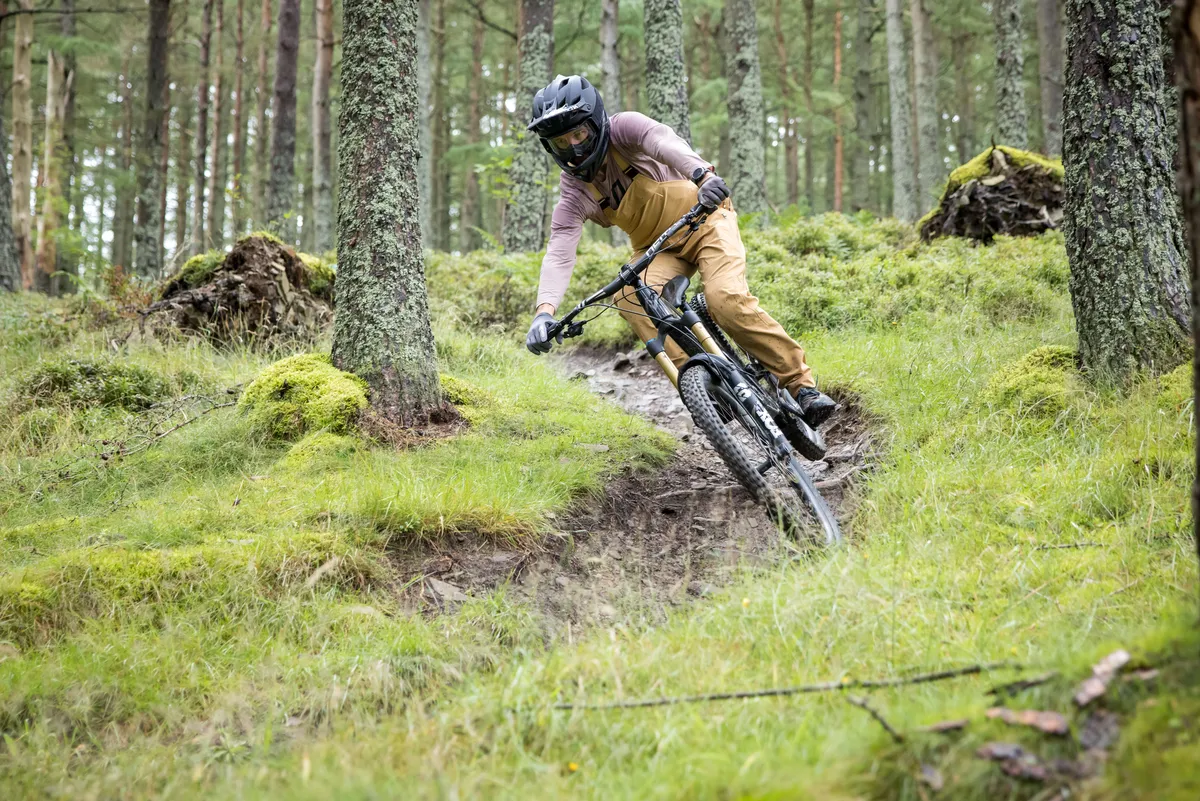
Point the Range towards rowdy terrain and it makes even more sense. The chunkier, choppier and faster the trails are, the more it comes alive, and the more control and reassurance it gives you.
Charging headlong into a rock- and root-littered section of jank isn’t like throwing caution to the wind; the Range has your back and will help you pull out the other side.
Its spec list is all but impossible to upgrade, which for the £8,999/$8,249/€9,999 asking price is a good job.
If you’re after a smooth-feeling, hard-charging gravity monster that can comfortably be ridden to the tops of your favourite trails, and you aren’t on a budget, the Norco Range C1 should be on your shortlist.
Product
| Brand | Norco |
| Price | €9999.00, £8999.00, $8249.00 |
| br_whatWeTested | 2023 Norco Range C1 |
| Weight | 16.64kg |
Features
| Fork | Fox 38 Factory |
| Stem | Norco Alloy, 40mm |
| Chain | SRAM Eagle |
| Frame | Full Carbon, Ride Aligned |
| Tyres | Maxxis Assegai 3C MaxxGrip DoubleDown TR 29x2.5in (f), Maxxis Dissector 3C MaxxGrip DoubleDown TR 29x2.4in (r) |
| Brakes | SRAM Code RSC |
| Cranks | SRAM X1 |
| Saddle | Ergon SM10 Enduro Comp |
| Wheels | DT Swiss EXC 1501 |
| Headset | Cane Creek |
| Shifter | SRAM X01 Eagle |
| Cassette | SRAM Eagle HG1275 |
| Seatpost | OneUp Dropper V2 210mm |
| Grips/tape | DMR Deathgrip Soft, Thin |
| Handlebar | Deity Skywire Carbon, 800mm |
| Rear shock | Fox DHX2 Factory |
| Bottom bracket | SRAM DUB |
| Available sizes | S, M, L, XL |
| Rear derailleur | SRAM X01 Eagle |
